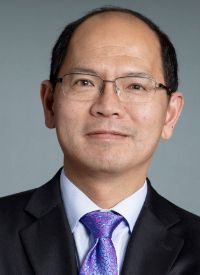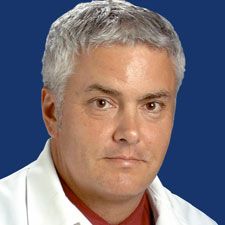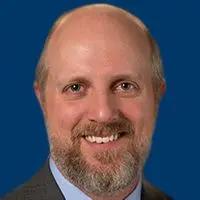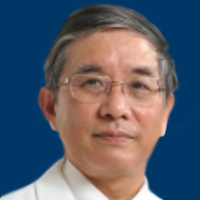Treatment Breakthroughs Advance Care Across Heterogeneous NSCLC Population
Kwok-Kin Wong, MD, PhD, discusses updates in non–small cell lung cancer and the importance of enrolling patients in clinical trials to further progress the field.

Kwok-Kin Wong, MD, PhD
Single-agent immunotherapy, targeted therapies, and combinations of the 2 are demonstrating durable responses of up to 7 years in subsets of patients with advanced non—small cell lung cancer (NSCLC), giving physicians hope that the benefit can be extended to a greater proportion of patients, said Kwok-Kin Wong, MD, PhD.
“It is an amazing time to think about the combinations of drugs we can put together to increase the number of patients who respond to either targeted therapy or immunotherapy,” said Wong, Anne Murnick Cogan and David H. Cogan Professor of Oncology, Department of Medicine, and director of the Division of Hematology and Medical Oncology at NYU Langone’s Perlmutter Cancer Center. “Immunotherapy has come to the forefront of the treatment of lung cancer patients.”
Clinical trials continue to push the needle forward and have proven essential for patients with nononcogene-driven and oncogene-driven disease. For example, the combination of atezolizumab (Tecentriq) with bevacizumab (Avastin), carboplatin, and paclitaxel (BCP) resulted in a 22% reduction in the risk of death versus BCP alone as frontline treatment for patients with metastatic disease. Results reported from the phase III IMpower150 trial led to the FDA approval of this regimen in December 2018.
Moreover, next-generation TKIs continue to emerge for both EGFR-mutated and ALK-positive lung cancer treatment. In April 2018, the third-generation TKI osimertinib (Tagrisso) was approved by the FDA for patients with EGFR-mutated NSCLC based on the results from the phase III FLAURA trial. Later that year, the results from the phase II B7461001 trial were released, which led to lorlatinib’s (Lorbrena) second-line approval for patients with ALK-positive disease.
OncLive: What are some exciting data we have seen to date in lung cancer?
In an interview during the 2018 OncLive® State of the Science Summit™ on Advanced Non—Small Cell Lung Cancer, Wong discussed updates in NSCLC and the importance of enrolling patients in clinical trials to further progress the field.Wong: NSCLC is a very heterogeneous disease. We can divide it into cancers that have known oncogenic drivers and cancers in which there are no oncogenic drivers. Incredible advances have been made on both sides. For oncogene-driven lung cancer, we are developing new drugs and more of those drugs are getting FDA approval.
For nononcogene-driven lung cancer or oncogene-driven lung cancer for which we do not have available therapies, immunotherapy has had an incredible impact on the treatment of these patients. We are extending the survival of these patients by months, if not years.
In a very small subset of patients with advanced lung cancer, we are seeing cures or durable response rates for up to 7 years. It is something I never thought would happen in my lifetime. When you start going that far out, you can start to think about the potential for cure. Unfortunately, that is a very small subset of patients.
At this point, which patients do you recommend to go on a clinical trial?
Has lung cancer become a chronic disease similar to some other cancers?
What is the outlook for these patients?
There are many interesting ongoing clinical trials that are trying to extend the duration of response for the majority of patients whose benefits only measure about 12 to 18 months with immunotherapy.A patient who has exhausted all standard treatments would benefit from clinical trials. This is the only way we can objectively measure how a novel drug that has not been FDA approved [performs] and whether it works better than the standard of care. We can learn quite a bit about the patient's cancer, as well as the biology behind the cancer with clinical trials. Clinical trials have now become so sophisticated that we can learn about that particular patient's disease and extend that knowledge to other patients.We're getting there, but we are not quite there yet. We talk about the tail in the overall survival [curve]. There are patients who have extended survival up to 7 years. For those patients, that is a chronic disease. Again, that is a small subpopulation of patients. We want to expand that population.[The prognosis] has completely changed the way we look at lung cancer. When a patient with advanced lung cancer came in 7 years ago, we told them the prognosis was about 12 to 18 months. Now, we can honestly say that we do not know. We have patients with advanced lung cancer who are 5 to 7 years out with no known oncogenic drivers.
With oncogene-driven lung cancer, we have made incredible progress. We have second-generation targeted therapies. For a subset of those patients, we are turning the cancer into a chronic disease. You have to divide patients into those with known oncogenic drivers for which there are targeted therapies, those with no known oncogenic drivers, or those with oncogene-driven lung cancer for which we do not have drugs yet.
References
- Socinski MA, Jotte R, Cappuzzo F, et al. Overall survival (OS) analysis of IMpower150, a randomized ph 3 study of atezolizumab (atezo) chemotherapy (chemo) ± bevacizumab (bev) vs chemo + bev in 1L nonsquamous (NSQ) NSCLC. J Clin Oncol. 2018;36 (suppl; abstr 9002).
- Socinski MA, Jotte RM, Cappuzzo F, et al. Atezolizumab for first-line treatment of metastatic nonsquamous NSCLC. N Engl J Med. 2018; 378:2288-2301. doi: 10.1056/NEJMoa1716948.



